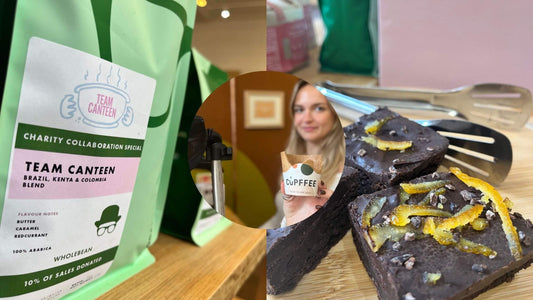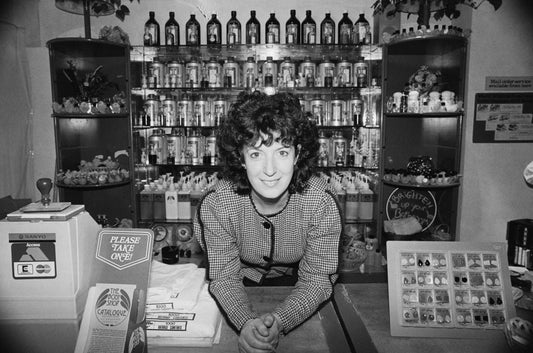An interview with maker Becca Thorne Illustration as part of our 'Get to Know...' series.
Tell us a little about yourself and your business…
I'm an illustrator and printmaker working in linocut. My work celebrates the natural world, with a focus on UK wildlife, habitats and conservation. My style is distinctive, stylised and full of movement, with influence from Anglo Saxon and Medieval art and craft.
Where are you based?
Brislington
Tell us a secret about you?
I know a lot about bumblebees for someone who's absolutely not an entomologist.
How do you make your work?
I work in linocut, a relief printmaking method that involves carving a design into a block of lino and then inking up the design and printing it onto paper. I don't have space for a press, so all my pieces are printed by hand using a teaspoon. The paper goes on top of the inked block and then I use the teaspoon to rub over the paper to transfer the ink. It takes longer than printing with a press, but it gives great control over ink distribution.
Describe your studio…
I've got a home studio. It's also our spare room, so a sofa bed takes up quite a lot of space, and guests have to try to manoeuvre themselves around all my stuff. My desk sits in front of the window, looking out over the garden so I can watch the plants and the birds and the local cats. There's not enough room for a press, but I've got a little printing table that folds out from the wall, where I hand burnish all my prints. When I keep it tidy, it's a pretty great space.
Tell us about your materials - where do you source them from and are they important to you?
Material choices are super important to me. Most of what I use is fairly easy to get hold of through art and printmaking suppliers, but mostly online. Traditional artist's lino is compostable, so I know I can put all my carving curls in the compost bin, and then onto my garden. Most offcuts get saved for smaller work. I mostly use Safewash inks, which can be cleaned up with (eco-friendly) soap and water, and when I use oil-based inks I clean up with vegetable oil, soap and water instead of solvents. My paper is sustainably produced lokta paper from Nepal, which is made from a native shrub that's harvested by coppicing and allowed to regrow.
I outsource the printing of cards and tea towels, and the companies were carefully researched. Cards are 100% recycled and printed by Sixprint, a Cornish printer who donate to the Woodland Trust with every order. Tea towels are printed in Cheshire by Meshtex, on 100% organic, unbleached cotton.
I keep packaging to an absolute minimum. I sell cards naked, completely packaging free, unless shops demand it, and then I use compostable wraps, but I try to avoid it. I only use 100% recycled paper for packaging - preferably made with post-consumer waste. Packaging includes: acid free tissue paper, paper belly bands, blank postcards for thank you notes, compostable wrapping & seals for prints - all from Eco-craft. Recycled greyboard comes from eBay. Recycled paper stickers from Avery. Plastic free triangular cardboard postal tubes come from Kite Packaging. A big issue for me previously was that thermal address labels can't be recycled, but then NoIssue started making recyclable/compostable ones, so now I get those, and feel pretty smug!
Why is it important to you that your work is made as responsibly and sustainably as possible?
I grew up in the Forest of Dean, surrounded by woodland and wildlife, and the natural world was impossible to avoid (not that I wanted to). I've never lost that connection to nature, and my work is rooted in ideas of conservation and rewilding, celebrating wildlife and our environment. My research often involves carefully exploring threatened UK wildlife and habitats, so I'm very aware of how fragile these things are, and how badly we're harming them. I need to ensure that what I create, and how I sell it, does as little damage to all of that as possible.
How and why did you start your small business?
I studied Illustration at Falmouth College of Arts. I did all sorts of part time jobs while I was building up my freelance career, including working as a groom for a couple of years. I went full-time freelance a year before the financial crash hit, and I struggled to make illustration work for a couple of years. In 2010 we moved up to Leicester so my partner could return to uni, and I got a new part-time job teaching illustration at De Montfort Uni. I ended up doing that for 10 years, until we moved back to Bristol in 2020. That job really took over, and I was never able to settle properly into my own work, but quitting teaching gave me the chance to really explore the work I actually wanted to do, not just the stuff I thought would make me money. The pandemic made the creative community really active and visible online, which made it a lot easier to discover those networks in Bristol, and I was able to see my options so much more clearly, and really start enjoying my practice again.
Any fun facts about your business, or achievements you want to shout about?
In 2005, I was shortlisted in the Mercury Prize for Art and Music, which was judged by Peter Blake and ran alongside the Mercury Music Prize. I don't know if it happened any other year, and there's so little about it online that it almost feels like I dreamt it, but I swear it was a real thing!
What do you love most about your small business and do you have a favourite piece of work?
I love that I work with my hands, that I get to learn more about wildlife and nature while I work, and that I can share that knowledge and joy with other people. I also love that I'm not responsible for anyone else!
My favourite piece right now is a series - my Marginal Habitats. I love everything about them; researching them, designing them, carving them. They're kind of a pain to print, actually, but people respond to them really well, and I'm a big fan too!
What do you think are the benefits of people supporting independent business?
Spending at local independents keeps money in the local economy and increases the diversity of local shops, which means every neighbourhood could have something different and special, and not the same old shops as everywhere else. Speaking to local shopkeepers allows people to learn more about things happening locally, and increases the sense of belonging and joy in the local area. Exploring handcrafted work brings a better understanding and appreciation of the craft and skill that goes into making something, so better understanding of the true value of items, something that's become very distorted with mass-production. Plus, it just means you can find cool, interesting stuff that you wouldn't find elsewhere!
Tell us about your favourite purchase from a fellow maker. What is it and who made it?
Too hard! I recently bought my best friend some ceramic earrings by Wendy Calder that I would love to have kept for myself! But also, my partner gave me a gorgeous etching by Eska Marsh for Christmas. It’s called, 'Mysterious River Snake'. I first saw it when Eska and I were both exhibiting/selling in November, and fell in love with it.
What are your favourite things about PRIOR - both as a customer and a supplier?
As a customer, it's just so nice to know there's an independent, non-mass-market, ethical, local shop fighting its corner in Cabot Circus. I hate CC, it's everything I dislike: mass-market, people buying unnecessary crap as a leisure activity, and it's so busy and grotty. I honestly wouldn't go there if it wasn't for PRIOR! It's so nice to know that, by shopping at PRIOR, my money is going to support local makers who are doing things responsibly and not just adding to all the crap we generate.
As a supplier, I've learnt so much from Beck about the business of selling my work. As an illustrator I know all about licensing and promoting myself to illustration clients, but selling work in shops and to wholesalers is a whole other world, and PRIOR makes it so easy for suppliers to keep track and see what's going well (or not!), with the dashboard, regular stock updates, sold-out emails etc. Literally no other shop I know does it quite so brilliantly. Also, having my stuff in a big shop in Cabot Circus is insane.
Do you have a goal for where you’d love your business to be in the future?
More exhibitions, more print fairs. I want to be able to earn more from my artwork so I can say no to more of the boring and annoying illustration jobs that take away so much of the time I want to spend on my own stuff. But at the same time, I want to keep the good, fun illustration jobs!
View Becca Thorne's handmade collection at Prior Shop here.




